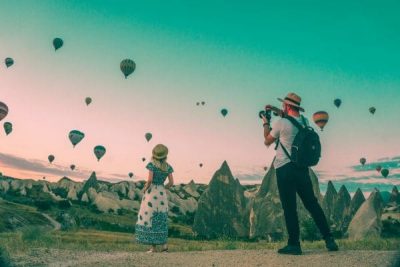The saying ‘sometimes travel doesn’t go as planned’ has taken on a whole new meaning in a COVID world and the past transformational year. Late 2020 travel predictions no longer apply and major tourist spots are beginning to reopen with hope, requirements of trip insurance, and new travel rules. As we roll into summer, travelers are restless and ready to knock items off of their bucket list. Ready to test the waters with vaccine tourism we’ve seen a rise in trip protection. Working with travel clients we’ve seen massive changes first-hand about their concerns and we are all looking forward to a positive travel future. For now, here’s what in-the-know-travelers can expect for future travel predictions.
Stay-cations Lessen as Corona-cations
Travel has had a staggered rollout across the U.S. with some destinations opening before others. As individual states mediate the safest way to reopen, many are already experiencing new travel inquiries, a rise in bookings and an expectation of increased safety. Trends include a rush for bookings that are a stone’s throw from nature, giving travelers more peace of mind. Yellowstone and Teton National Parks have opened a limited access plan and are expecting a continued surge in outdoor recreation. The U.S. is betting that travelers will fall in love with the road again and RV rentals are seeing a rise in bookings from previous years. All of which have never required trip insurance, but travelers are increasing their coverage knowing the unexpected can happen.
According to Guesty, a vacation rental platform, 2021 domestic travel planning is up, 82% of families already have travel plans for 2021. While it is still somewhat difficult to know the next steps one thing for certain is people are looking to nature and the outdoors for relief and the heightened safety level is being backed by health experts. “Enjoy nature. It’s good for us, and it has a very low risk.” Tom Frieden, former CDC director states.
Sanitization Will Continue to Be An Amenity
Positive travel campaigns are being launched around the world with some of the hardest-hit destinations getting creative in their marketing efforts. Including Japan’s 2020 travel campaign offering to cover a portion of travel costs and casinos giving free flights to Las Vegas to get things restarted again. This includes marketing buzzwords like ‘hygiene inspections’, ‘quality control’, and ‘enhanced health measures’. New sanitization certifications and criteria models are popping up on a global scale, and won’t be going away anytime soon. Thailand recently launched the SHA – Safety and Health Administration Hygiene Certification to boost its tourism and large cruise lines have been some of the first to publicize their new health standards, and partner with trip insurance companies to provide travel protection.
Would-be travelers are meticulously checking company websites for health protocol plans that detail their health-safety standards, and double checking their trip insurance. These initiatives are providing people a level of confidence as travel recovers. It’s also a look inside the post-COVID traveler’s mind as an informed survival strategy that will become the norm for traveler checklists comparable to booking travel insurance or opting for a better airline seat. Sanitization will be a highly desired amenity and suddenly seem like a privilege.
Eco Standards Rebound and Increase
Places that have long relied on tourism, some poised to see their best season ever earlier in the year, now face a contrasting view. The world stopped traveling and at the same time, the rare stillness has made travelers more aware of the environmental impact of travel. Reports of cleaner rivers, oceans, and air quality were reported over the past year worldwide. This is an opportunity to change the rules and many already have, including smart travel companies. Athens, Paris, and Berlin have all put eco-focused city planning in place for additional bike paths, green areas and are working to do their part for sustainable city living. At the same time working on comprehensive plans for return to safe international travelers.
Many companies are stepping up in positive ways just when travelers need them. The need to communicate a sustainable message is loud and clear and thriving in conversations from Twitter chats to virtual CEO meetings. Airlines are taking a deeper look at vastly improving their efficiencies that have been on the backburner for years. This is a serious topic and has made us all aware of where we can create better systems in travel.
Flexible Fees and Cancellations
While many travelers have struggled with refunds and how to rebook canceled plans, many have also received extra benefits, offers, and hold off on their travel plans. People were clamoring to understand what to do when they could travel, and how their trip insurance was going to protect them. What resulted with many travel brands was a bit more empathy, flexibility, and humanization behind their brand and how to support their clients as they faced an unknown landscape. Trip protection is a big part of ensuring a change of travel plans won’t ruin your day.
Fast-acting brands have put traditional marketing aside and are reaching consumers in new ways. In 2020 airlines and cruise lines began offering full refunds, plus 125 percent future credits and flexible rebooking options. The small print intricacies of travel insurance policies and terms of passage were updated to reflect Coronavirus and that separated those able to pivot from those looking to catch up and travelers have noticed the difference. It’s likely we will continue to find cheaper deals throughout tourism and hospitality for some time.
Travel may not be ‘normal’ just yet but it’s not stopping eager travelers from planning their dream trip and protecting it with trip insurance. We can expect many trends to continue and for savvy travelers to be more responsible in their travel choices. Will wanderlust ever be the same? We think so, maybe even better.

